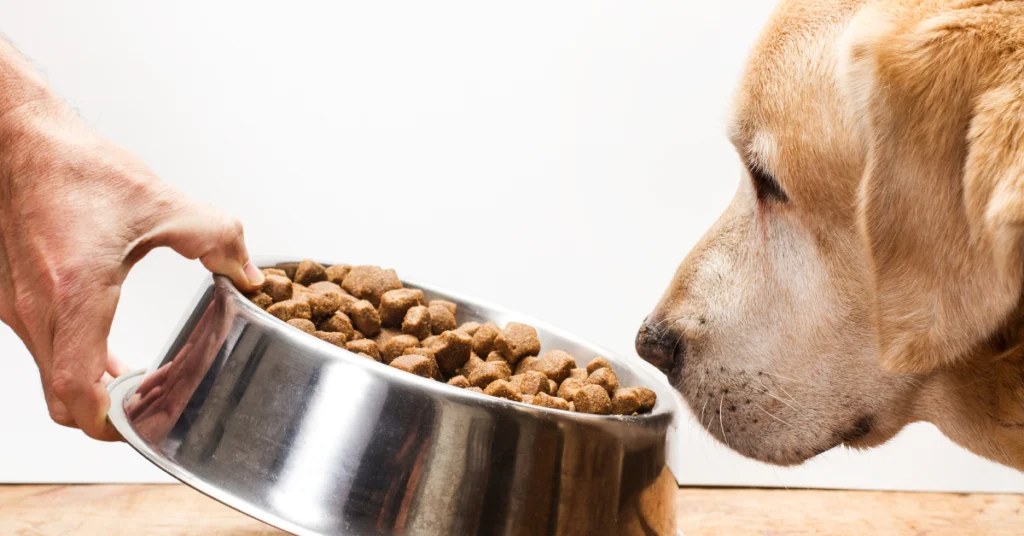Kidney disease is a common and serious disease in dogs that affects their ability to filter waste from the blood. Managing your dog’s diet is important to slow the progression of the disease and maintain their quality of life. Conventional dog food cannot always meet the unique dietary needs of a dog with kidney problems.
Natural feeding methods can provide a healthier alternative, providing essential nutrients while supporting kidney function. In this blog, we will explore how to naturally feed a dog with kidney disease, as well as provide practical tips, nutritious recipes, and advice to help pet owners make informed choices for their dog’s well-being.
Contents
- 1 Understanding Kidney Disease In Dogs
- 2 Types Of Kidney Disease
- 3 Common Causes Of Kidney Disease In Dogs
- 4 Symptoms Of Kidney Disease In Dogs
- 5 What Not To Feed Dogs With Kidney Disease?
- 6 How To Feed A Dog With Kidney Disease Naturally?
- 7 Homemade Diet For Dogs With Kidney Disease
- 8 Can I Give My Dog Supplements Or Herbs For Kidney Disease?
- 9 Conclusion
- 10 FAQ – How To Feed A Dog With Kidney Disease Naturally?
Understanding Kidney Disease In Dogs
Kidney disease, also known as renal disease, is a common condition in dogs that affects their kidney’s ability to filter waste from the blood effectively.

It can be chronic, which develops slowly over time, or acute, which occurs suddenly due to factors such as infection, toxins, or dehydration. Pet owners must understand this disease in order to manage their dog’s health and well-being.
Types Of Kidney Disease
Two types of kidney diseases in dogs –
- Chronic Kidney Disease – This disease progresses slowly over months or years and is most often seen in older dogs. This form of the disease is usually irreversible but can be managed with proper care and diet.
- Acute Kidney Injury – It develops suddenly, often due to infection, exposure to toxins (such as certain medications or foods), or severe dehydration. Depending on the cause and severity, it can be cured by prompt treatment.
Such serious cases can leave you out of pocket, so a dog insurance policy is amazing in this heartbreaking situation. Take a step to gain knowledge about dog insurance policies and how they work, so you can save your money and save your dog too.
Common Causes Of Kidney Disease In Dogs
It is important to be aware of the causes and symptoms in order to get the proper treatment for kidney disease in dogs.
Genetics – Certain breeds are more prone to kidney disease.
Infections – Bacterial infections such as leptospirosis can damage the kidneys.
Toxins – Exposure to substances like antifreeze, certain medications, or foods (e.g. grapes, raisins) can lead to kidney damage.
Underlying Health Conditions – Diabetes, high blood pressure, or urinary obstruction can cause kidney problems.
Age – Kidney function naturally declines with age, increasing the risk of kidney disease in elderly dogs.
Symptoms Of Kidney Disease In Dogs
- Increased Thirst And Urination – Often one of the first signs.
- Loss Of Appetite – Dogs may eat less or refuse food.
- Weight Loss – Cause by a lack of appetite and muscle wasting.
- Lethargy and Weakness – Reduced energy levels and difficulty with movement.
- Vomiting And Diarrhea – Common as toxins build up in the body.
- Bad Breath – A distinct, often ammonia-like smell can develop due to toxin accumulation.
- Oral Ulcers – Sores may appear in the mouth due to high toxin levels.
- Pale Gums – Can indicate anemia, a common side effect of kidney disease.
What Not To Feed Dogs With Kidney Disease?
For canine good health, it’s important to understand which foods should be avoided in a dog diet with kidney disease. Feeding a dog with kidney disease requires careful attention together to avoid foods that can worsen their condition or put extra strain on their kidneys.

Certain foods can increase the buildup of toxins, cause dehydration, or accelerate the decline in kidney function. Here are some of the key foods and ingredients you should avoid:
High-Protein Foods
Excessive protein can be taxing on a dog’s kidneys, causing a build-up of waste products such as urea and creatinine. This can worsen symptoms such as nausea, vomiting, and loss of appetite.
- Examples To Avoid – Red meat (such as beef and lamb), organ meats (such as liver and kidney), eggs, high-protein foods, and formulated foods for high-energy dogs or working dogs.
High Phosphorus Foods
High phosphorus levels can further damage the kidneys and worsen symptoms of kidney disease, such as weakened bones and loss of appetite.
- Examples To Avoid – Dairy products (like salmon, tuna, and sardines), seeds (like sunflower seeds and pumpkin seeds), and nuts (like almonds and peanuts).
Salty Foods
Salt (sodium) can cause increased blood pressure and fluid retention, which is especially harmful for dogs with kidney disease.
- Examples To Avoid – Processed meats (like sausages, bacon, and delivery meats), salty snacks (like chips and pretzels), and human food seasoned with salt.
Foods With Artificial Additives And Preservatives
Artificial additives, preservatives, and coloring agents can be harder for the kidneys to process, increasing the workload and potentially causing additional stress.
- Examples To Avoid – Commercial dog foods containing artificial colors and preservatives, processed foods, and low-quality commercial dog foods containing unspecified “meat by-products.
Foods High In Oxalates
Oxalates may contribute to the formation of kidney stones, which can make kidney disease worse.
- Examples To Avoid – Spinach, beetroot, rhubarb, sweet potatoes, nuts, and some grains like quinoa.
Human Medications or Foods Containing NSAIDs
Nonsteroidal anti-inflammatory drugs (NSAIDs) and certain human foods containing these drugs can cause acute Kidney Injury or worsen existing kidney conditions.
- Examples To Avoid – Aspirin, ibuprofen, naproxen, and any foods that have come in contact with these medications.
By avoiding these foods and focusing on kidney-friendly alternatives, you can help manage your dog’s kidney disease more effectively and improve their quality of life.
How To Feed A Dog With Kidney Disease Naturally?
Feeding a dog with kidney disease naturally involves providing a diet that supports kidney function and reduces the workload on the kidneys. Focus on providing low protein, low phosphorus foods to reduce waste buildup in the blood.
Select high-quality, easy-to-digest proteins such as lean chicken, turkey, or fish in small amounts. Include fresh vegetables such as carrots, green beans, and pumpkin, which are low in phosphorus and beneficial for kidney health.
Include healthy fats such as fish oil or coconut oil to provide energy without increasing pressure on the kidneys. Keep your dog well hydrated by providing fresh water at all times and moisture-rich foods such as low-sodium broth. Avoid commercial dog foods with salty foods, high phosphorus content, and artificial additives.
You should consider homemade dog food according to your dog’s specific needs and consult a veterinarian or pet nutritionist to create a balanced diet plan. Regular monitoring and dietary adjustments are essential to effectively manage kidney disease.
Homemade Diet For Dogs With Kidney Disease
Making a homemade diet for dogs with kidney disease allows you to control the quality of the ingredients and customize the food to meet your dog’s specific needs. The goal is to provide low protein, low phosphorus, and easy-to-digest foods that support kidney function while providing essential nutrients.
Wait, I know you have doubts like –
- What is the best homemade diet for dogs with kidney disease?
- How can I prepare homemade meals for a dog with kidney disease?
Don’t worry, I am “Evan Antin”, a dog lover, who will guide you in this journey with this helpful The Pet Guidance platform.
Key Ingredients
Lean Proteins (In Moderation)
- Skinless chicken breast, turkey, or lean fish (like cod or tilapia).
- Eggs (use more whites than yolks to lower phosphorus)
Low Phosphorus Vegetable For Dogs With Kidney Disease
- Carrots, green beans, zucchini, cauliflower, and pumpkin. Cook them to enhance digestibility.
Healthy Fats
- Small amounts of fish oil, coconut oil, or olive oil provide energy and support skin and coat health.
Complex Carbohydrates
- White rice, sweet potatoes, or pasta for energy.
Herbs And Supplements
Consider adding herbs like parsley (for its diuretic properties) or turmeric (for anti-inflammatory benefits). Add supplements like omega-3 fatty acids to improve kidney health, but consult a vet first.
Recipe Ingredients:
- 1 cup cooked white rice
- ½ cup boiled, skinless chicken breast, finely chopped.
- ½ cup steamed low-phosphorus vegetables (carrots, green beans)
- 1 teaspoon fish oil
- A dash of parsley (optional)
Instructions
- Cook the rice and set it aside.
- Boil the chicken until fully cooked, then chop into small pieces.
- Steam the vegetables until soft and easily mashed.
- Mix all ingredients in a bowl, adding fish oil and parsley.
- Serve in portions based on your dog’s size and needs.
This homemade diet can be the best healthy diet for dogs. If you ask me: what is the best food to feed a dog with kidney failure? I would prefer the best food for a dog with kidney failure is one that is low in protein, phosphorus, and sodium while providing high-quality, easily digestible nutrients.
Check Out – How to feed a dog with Cushing’s disease naturally?
Can I Give My Dog Supplements Or Herbs For Kidney Disease?
Yes, some supplements and herbs can help dogs with kidney disease, but they should be used under the guidance of a veterinarian to ensure safety and efficacy. Common supplements include:
Omega-3 Fatty Acids
Found in fish oil, they help reduce inflammation and support kidney function.
Antioxidants
Vitamin E and C may help protect kidney cells from damage.
B-Complex Vitamins
It is beneficial for dogs with kidney disease due to increased water loss that may cause vitamin deficiencies.
CoQ10
An antioxidant that may support overall kidney health.
Herbs
Herbs such as dandelion (for its diuretic properties) and milk thistle (to provide support to the liver, which indirectly benefits the kidneys) are sometimes recommended.
Always consult your veterinarian before starting any supplements or herbs, as they may react with medications or cause side effects.
Conclusion
Feeding a dog with kidney disease naturally involves a balanced, nutritious diet that supports kidney function and minimizes the stress on these vital organs. By choosing the best dog food, high-quality, low protein foods, including fresh vegetables, and adding healthy fats, you can help manage your dog’s condition and improve their quality of life.
Always keep your dog hydrated and avoid foods rich in phosphorus or sodium. Consult your veterinarian regularly to tailor your dog’s diet to his specific needs. With careful attention to his diet and consistent monitoring, you can provide your dog with the care he needs to live a happy, healthy life.
“If your dog suffers from pancreatitis, Cushing disease, and any other disease then you should be aware of the Top 10 dog foods recommended by experts for 2024!”
FAQ – How To Feed A Dog With Kidney Disease Naturally?
What To Feed A Dog With Kidney Failure Who Will Not Eat?
For a dog with kidney failure who won’t eat, try offering a small amount of warm, tasty food such as boiled chicken or low-sodium broth to stimulate appetite. You can also try renal diet dog food, wet foods, or hand feeding. Consult your veterinarian for appetite enhancers or other interventions if the problem persists.
What Are The Best Non-prescription Dog Food For Kidney Disease?
The best non-prescription dog food for kidney disease is low in protein, phosphorus, and sodium. Look for high-quality brands like Hill’s Science Diet Adult 7+ Beef & Barley Entree, and Blue Buffalo Natural Veterinary Diet KS Kidney Support. Always consult your veterinarian before choosing a non-prescription option to make sure it meets your dog’s specific needs.
How Much Protein Should A Dog With Kidney Disease Consume?
Dogs suffering from kidney disease should consume small amounts of high-quality protein, usually around 14-20% of their daily calorie intake, depending on the stage of the disease and individual needs. Always consult your veterinarian for specific recommendations.
Are There Any Special Considerations For Feeding Senior Dogs With Kidney Disease?
Yes, senior dogs with kidney disease need a low protein, low phosphorus diet, and easy-to-digest food. Make sure they stay hydrated and consider adding supplements like omega-3 fatty acids. Regular vet checkups are important to monitor kidney function and adjust the diet as needed.

I’m Dr. Evan Antin, an animal expert and exotic animal veterinarian with a passion for helping pets and their owners thrive. With years of experience working with animals of all kinds, I bring a unique perspective to dog training, offering personalized in-home training sessions that cater to your dog’s specific needs. My goal is to create a strong bond between you and your pet through effective, compassionate techniques. Whether you’re dealing with behavioral issues or simply want to strengthen your dog’s skills, I’m here to help you achieve lasting, positive results.

